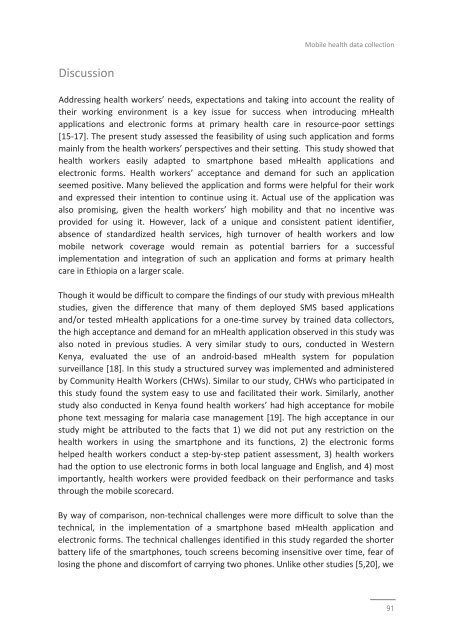araya-thesis
araya-thesis
araya-thesis
Create successful ePaper yourself
Turn your PDF publications into a flip-book with our unique Google optimized e-Paper software.
Mobile health data collection<br />
Discussion<br />
Addressing health workers’ needs, expectations and taking into account the reality of<br />
their working environment is a key issue for success when introducing mHealth<br />
applications and electronic forms at primary health care in resource‐poor settings<br />
[15‐17]. The present study assessed the feasibility of using such application and forms<br />
mainly from the health workers’ perspectives and their setting. This study showed that<br />
health workers easily adapted to smartphone based mHealth applications and<br />
electronic forms. Health workers’ acceptance and demand for such an application<br />
seemed positive. Many believed the application and forms were helpful for their work<br />
and expressed their intention to continue using it. Actual use of the application was<br />
also promising, given the health workers’ high mobility and that no incentive was<br />
provided for using it. However, lack of a unique and consistent patient identifier,<br />
absence of standardized health services, high turnover of health workers and low<br />
mobile network coverage would remain as potential barriers for a successful<br />
implementation and integration of such an application and forms at primary health<br />
care in Ethiopia on a larger scale.<br />
Though it would be difficult to compare the findings of our study with previous mHealth<br />
studies, given the difference that many of them deployed SMS based applications<br />
and/or tested mHealth applications for a one‐time survey by trained data collectors,<br />
the high acceptance and demand for an mHealth application observed in this study was<br />
also noted in previous studies. A very similar study to ours, conducted in Western<br />
Kenya, evaluated the use of an android‐based mHealth system for population<br />
surveillance [18]. In this study a structured survey was implemented and administered<br />
by Community Health Workers (CHWs). Similar to our study, CHWs who participated in<br />
this study found the system easy to use and facilitated their work. Similarly, another<br />
study also conducted in Kenya found health workers’ had high acceptance for mobile<br />
phone text messaging for malaria case management [19]. The high acceptance in our<br />
study might be attributed to the facts that 1) we did not put any restriction on the<br />
health workers in using the smartphone and its functions, 2) the electronic forms<br />
helped health workers conduct a step‐by‐step patient assessment, 3) health workers<br />
had the option to use electronic forms in both local language and English, and 4) most<br />
importantly, health workers were provided feedback on their performance and tasks<br />
through the mobile scorecard.<br />
By way of comparison, non‐technical challenges were more difficult to solve than the<br />
technical, in the implementation of a smartphone based mHealth application and<br />
electronic forms. The technical challenges identified in this study regarded the shorter<br />
battery life of the smartphones, touch screens becoming insensitive over time, fear of<br />
losing the phone and discomfort of carrying two phones. Unlike other studies [5,20], we<br />
91


